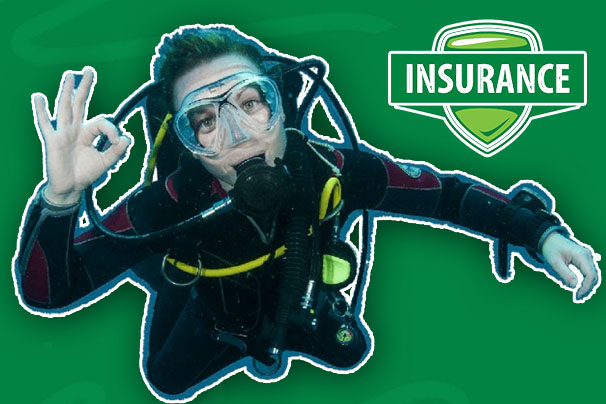Are you a scuba diver in search of insurance products to protect yourself while engaging in scuba diving? If yes, stumbling on this piece of writing is not a coincidence! Scuba diving is an exciting and occasionally unpredictable sport that comes with some risks, such as the possibility of accidents, medical issues, and equipment malfunctions.

Scuba diving insurance is a special type of insurance that is designed to shield divers from certain dangers related to underwater activities. Whether you are a recreational or professional diver, purchasing scuba diving coverage is crucial.
This is because most standard health insurance policies do not cover the particular hazards associated with diving. With this type of insurance, scuba divers can dive with peace of mind knowing that they have coverage for medical costs, trip cancellations, lost or damaged gear, and even emergency evacuation.
Risk Involved in Scuba Diving
Although scuba diving is considered a safe and exciting sport, we can’t rule out the fact that there are several risks attached.
Even when it is done under the supervision of professional divers, there are cases where a specific risk will rear its face, and it may incur severe damage to the diver.
As a result of the risks and dangers involved in scuba diving, most insurance companies label it as an ‘extreme sport.’.
Here are common examples of risks involved in scuba diving:
- Decompression sickness (DCS)
- Ear and sinus barotrauma
- Pulmonary barotrauma
- Arterial gas embolism
- Nitrogen narcosis
- Equipment failure
- Poor visibility
- Strong currents
- Marine life hazards (e.g., stings, bites)
- Entrapment or getting lost
- Hypothermia
- Panic or anxiety underwater
- Drowning
- Surface intervals and rapid ascents
- Injury during entry or exit
These and many more are typical examples of potential risks of scuba diving. Since a standard travel and health insurance policy does not cover expenses related to scuba activities, purchasing scuba diving insurance is an ideal option.
What Does Scuba Diving Insurance Cover?
Typically, a scuba diving policy offers coverage for medical expenses and other costs associated with accidents and damage incurred from scuba diving activities.
Although it provides essential coverage for medical expenses, scuba diving coverage also covers
- Lost or damaged diving equipment.
- Cost of transportation from the dive site to the medical center.
- Emergency evacuation and repatriations.
- Trip cancellation or interruption.
- Loss of hands, feet, or eyesight.
- Decompression sickness treatment
- Search and rescue costs.
Depending on the type of policy you bought and the insurance company you are working with, there may be other coverage options aside from the aforementioned ones.
You can check your policy document or reach out to your insurance company for further clarification on what your policy covers.
What Is Not Covered?
Most insurance policies have their specific limitations; scuba diving insurance is not an exception.
- Injuries due to reckless behavior
- Diving without proper certification
- Normal wear and tear
- Non-diving-related medical expenses
- Personal liability outside of diving activities
- Diving in unapproved or unsafe locations
- Accidents caused by alcohol or drug use
- Pre-existing medical conditions
When purchasing scuba diving coverage, it is important to have an idea of the exclusions of your policy. In the event of an accident, you will be able to know if the claim meets the parameters of your policy or not.
Who Sells Scuba Diving Insurance?
Scuba divers can purchase diving insurance from several reputable insurance companies, which focus on adventures, sports, and travel. Insurance companies that specialize in offering extensive coverage for divers include Divers Alert Network (DAN) and World Nomads.
These insurers understand the hazards involved with scuba diving, and as such, they provide scuba diving coverage that covers medical emergencies, evacuation, and dive-related equipment.
Both recreational and professional divers can purchase scuba diving from either DAN or World Nomads and enjoy perks like coverage for lost gear and trip cancellation.
Furthermore, besides insurers that specialize in providing coverage for scuba divers, there are traditional travel insurance companies that may offer policies that include scuba diving coverage as an add-on or rider.
While these companies may offer coverage that covers diving, policyholders must carefully review the terms of the policy to make sure the coverage matches their unique diving needs.
In general, scuba divers are encouraged to shop around and compare offers from several companies when deciding on which policy to opt for. This would also enable you to weigh your options and select an insurance company that provides sufficient protection that fit your diving needs and budget.
FAQs
What is scuba diving insurance?
This insurance is a type of insurance specially designed to cover hazards related to underwater diving, such as emergency evacuation, medical bills, and equipment loss.
Who needs scuba diving insurance?
Scuba diving insurance is typically designed for anyone who participates in scuba diving.
Whether you are a recreational or professional scuba diver, consider purchasing scuba diving insurance to protect yourself from potential hazards.
How much does it cost?
The cost of this insurance varies significantly across multiple insurers and is also contingent on several factors.
Insurance companies will take a look at your diving experience, coverage limits, and other factors when determining how much you will be charged for premiums.
Do I need scuba diving insurance if I have health insurance?
Even if you have a health insurance policy, you still need scuba diving insurance for comprehensive protection.
Most standard health insurance policies do not offer coverage for diving-related injuries; hence, the a need to have additional coverage.
Leave a Reply